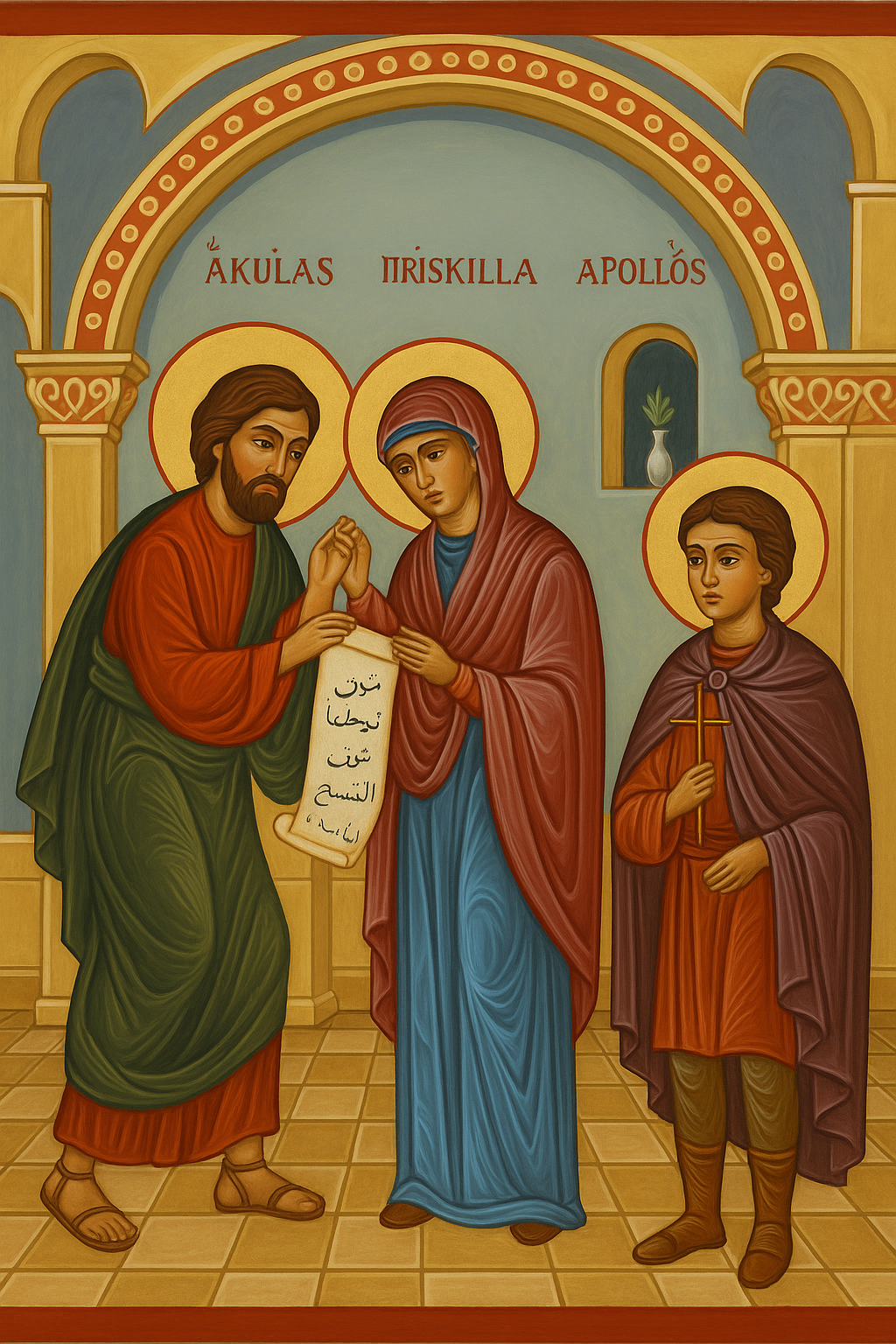Explaining the Way of God More Accurately – Acts 18:26 – Orthodox Faithfulness and Correction
In the Name of the Father, and the Son, and the Holy Spirit, One God. Amen.
May the blessing of the Father who calls us and His Only Begotten Son Jesus Christ who saves us, and the Holy Spirit who sanctifies and transforms us be with us all, that we may hear His word and bear fruit—thirty, sixty, and a hundredfold. Amen.
“Explaining the Way of God More Accurately” – A Call to Orthodox Courage
Focus Verse: “They took him aside and explained to him the way of God more accurately.” – Acts 18:26 (NKJV)
When Aquila and Priscilla heard Apollos preaching with fervent spirit in the synagogue, they did not interrupt him or shame him publicly. Instead, they took him aside with humility, clarity, and love—and explained to him the way of God more accurately. Why? Because his salvation and the salvation of his listeners depended on it.
This is our Orthodox calling: to be faithful, not just emotional; accurate, not just enthusiastic; Spirit-filled, but also truth-filled. Apollos had zeal—but his teaching was incomplete. He knew only the baptism of John. But through loving correction and Orthodox instruction, he became an even greater preacher of Christ.
Saint John Chrysostom observes:
“He was fervent, then, in the Spirit, knowing only the baptism of John: but these expounded to him more perfectly… It is likely that he did in fact receive baptism.” — St. John Chrysostom, Homily on Acts 18
This is the sacred responsibility of the Church: to explain the truth accurately. And this is the humility of the saints: to receive correction in the Spirit.
I. The Need to Correct Error with Love
The Orthodox Church has always understood that salvation is not merely about sincerity—but about truth in love. As St. Paul told Timothy:
“Take heed to yourself and to the doctrine. Continue in them, for in doing this you will save both yourself and those who hear you.” – 1 Timothy 4:16 (NKJV)
Saint Basil the Great said:
“Zeal without knowledge is fire without light.” — St. Basil the Great
In our time, many well-meaning believers preach incomplete or erroneous teachings. Some deny the sacraments, others dismiss apostolic tradition. Like Apollos, they may be fervent—but they are missing the full light of the Church.
We must be like Aquila and Priscilla. Not loud. Not boastful. But intentional and loving. We must pull aside those we love and explain the way of God more accurately. For love without truth is sentimentality, and truth without love is brutality. But together, they bring transformation.
abouna andrew
II. The Apostolic Model of Unity: One Faith, One Baptism
The Book of Acts presents a model for unity:
“And they continued steadfastly in the apostles’ doctrine and fellowship, in the breaking of bread, and in prayers.” – Acts 2:42 (NKJV)
Unity came from a steadfast commitment to:
- The Apostles’ doctrine – not personal opinions
- Fellowship – not division
- Breaking of bread (the Eucharist) – not spiritual shortcuts
- Prayer – not disorderly emotion
The Apostolic Fathers preserved this unity. In the Didache, one of the earliest Christian texts, it is written:
“Do not let your fasts be with the hypocrites… but fast on Wednesdays and Fridays… Let no one eat or drink of your Eucharist unless they have been baptized in the Name of the Lord.”
Saint Ignatius of Antioch, a disciple of St. John the Apostle, said:
“Where the bishop is, there is the Church… Let no one do anything of concern to the Church without the bishop.” — Epistle to the Smyrnaeans
This is Christian unity: not vague emotional bonds, but shared commitment to the apostolic teaching and the Eucharistic life.
III. Apollos, Humility, and Receiving Correction
Apollos, though eloquent and mighty in the Scriptures, humbled himself. This humility made room for his full conversion—culminating in his baptism in the name of the Lord Jesus, and his receiving of the Holy Spirit.
“He vigorously refuted the Jews publicly, showing from the Scriptures that Jesus is the Christ.” – Acts 18:28 (NKJV)
St. John Chrysostom again comments:
“It was not for nothing that [Paul] left [Priscilla and Aquila] at Ephesus, but for Apollos’ sake, the Spirit so ordered it, that he might come with greater force.” — Homily on Acts 18
This shows us two things:
- God places people in our lives to correct us in love.
- We must be humble enough to receive correction and grow in truth.
IV. Orthodox Education and Preserving Truth
The Church Fathers did not invent doctrine—they preserved it.
St. Irenaeus writes:
“The Church, though dispersed throughout the whole world… has received this faith from the Apostles and their disciples.” — Against Heresies, Book I
When there was an error, the Fathers responded—not with anger, but with clarity. St. Cyril of Alexandria defended the nature of Christ. St. Athanasius stood against the Arian heresy. St. John Chrysostom taught the people daily from the Scriptures.
Orthodox theology is not dry academia. It is the fire of truth that guards salvation.
abouna andrew
As St. Peter warns us:
“…which untaught and unstable people twist to their own destruction, as they do also the rest of the Scriptures.” – 2 Peter 3:16 (NKJV)
And yet, in every generation, God raises Aquilas and Priscillas to speak truth in love—and Apolloses who are willing to receive it.
V. The Desert Fathers and the Practice of Correction
The Desert Fathers remind us that silence is not always spiritual when truth is at stake.
Abba Poemen once said:
“If a man has sinned and denies it, saying, ‘I have not sinned,’ do not correct him with anger. But say to him, ‘Do not be discouraged, brother. Let us take it to God, and He will help us.’” (Ward, Sayings of the Desert Fathers, Abba Poemen)
This gentle correction preserves both truth and relationship. But it must be done. To ignore false teaching is to let a wound fester.
St. Anthony the Great, when asked about heretical teachers, said:
“There is no benefit in much speech when it does not lead to the truth. Even silence can betray Christ if it covers error.”
(Paraphrased /Attributed to St. Anthony the Great)
Likewise, St. Shenouda the Archimandrite taught his monks:
“Be careful what you teach. For the word that leads others astray will weigh more heavily than a stone on your soul.”
(Paraphrased from teachings preserved in the Canons of St. Shenoute)
A genuine Orthodox Christian is never passive in the face of error. Not angry, not proud—but not passive.
VI. Coptic Saints Who Corrected with Courage
One example from our Coptic tradition is St. Athanasius the Apostolic, who stood almost alone against the Arian heresy. Even when exiled five times, he held firm to the truth that Christ is fully God and fully man.
He said:
“If the world is against the truth, then I am against the world.”
Another beautiful example is St. Didymus the Blind, who taught the mystery of the Holy Trinity clearly, though physically blind, seeing deeper than many in the faith.
And what of St. Cyril of Alexandria, who guarded the faith against Nestorius’ false teaching? His correction was not personal—it was pastoral. His goal was to restore the truth for the sake of the salvation of souls and the unity of the Church.
VII. Practical Lessons for Today
What can we learn?
- Correct Doctrine Matters for Salvation As St. Paul told Timothy: “Guard what was committed to your trust… by professing it, some have strayed concerning the faith.” – 1 Timothy 6:20-21 (NKJV)
- Correction Must Be Done with Love. Like Aquila and Priscilla, we must speak personally and gently, not to win arguments, but to win souls.
- Be Humble Like Apollos. When corrected, Apollos listened. He didn’t let pride block his salvation. Are we open to being corrected?
- Teach Your Family and Community. Just as Aquila and Priscilla were a married couple, teaching and preserving the faith, we too must see our homes as places where sound teaching dwells.
- Unity Comes Through Truth, Not Compromise. As St. Paul said: “One Lord, one faith, one baptism.” – Ephesians 4:5 (NKJV) Unity without truth is a false peace.
VIII. A Final Word of Encouragement
Let us remember: when we correct others in love, we imitate Christ the Good Shepherd. He did not ignore the lost sheep—He went after it. And He did not leave the Pharisees in silence—He confronted them for their own salvation.
Let us also be like Apollos, fervent in spirit, but humble enough to grow.
Let us be like Aquila and Priscilla, speaking truth with patience and clarity.
And above all, let us be faithful to the Orthodox Church, where the truth is preserved and where salvation is lived.
abouna andrew
“If anyone preaches any other gospel to you than what you have received, let him be accursed.” – Galatians 1:9 (NKJV)
- This is not fanaticism. It is faithfulness.
- This is not judgment. It is healing.
- This is not pride. It is love.
May the Lord give us wisdom, discernment, and bold love to explain “the way of God more accurately.”
May the Lord bless us, transform our hearts and minds, that our homes may stand on the Rock, our hands serve in the harvest, and our hearts long for Heaven. Amen.

